By: Chu Ya-Fen, Department of Public Affairs, Guandu Nature Park
Since 2022, the Wistron Foundation has partnered with the Guandu Nature Park Management Office to protect the wetland environment, provide safer wildlife habitats, and promote high-quality environmental education programs and facilities. This collaboration has increased opportunities for people to experience the beauty of wetlands firsthand.
In 2023, this collaborative spirit continued with an expanded adoption initiative, resulting in the following key achievements:
Moon Pond Adoption
Moon Pond is the largest artificial freshwater pond in the main facilities area of Guandu Nature Park. Since 2012, after slope stabilization with wooden piles, habitat creation for native plants, and the translocation and rehabilitation of native fish species, the pond now provides a stable, undisturbed natural environment for wildlife. It serves as a sanctuary for Taiwan’s freshwater fish, akin to a mythical Noah's Ark.
In 2022, with funding from the Wistron Foundation, we conducted an in-depth study of Moon Pond's ecosystem. The research revealed the presence of several invasive species, including the golden carp (Carassius cuvieri), striped snakehead (Channa striata), and red-eared slider (Trachemys scripta elegans). These invasive species have significantly contributed to the decline of native fish populations and hindered the survival of aquatic plants.
To improve the ecological environment of Moon Pond, restoration work began in July 2023. This process involved draining the pond to remove invasive fish species and replacing the overflow pipes. After the pond was dried out, aquatic plants were planted in late September, followed by a gradual refill of freshwater, slowly raising the water level to support the plants' growth. Native species from northern Taiwan, such as the Rosy bitterling (Rhodeus ocellatus) and the Chinese pond mussel (Sinanodonta woodiana), were reintroduced, restoring Moon Pond to the natural state typical of northern Taiwan ponds and providing a stable, safe habitat for native flora and fauna.
After the improvements, visitors can observe waterfowl from the Moon Pond platform as they splash and chase each other, flapping their wings and quacking away. From the second observation hut, you can also watch little grebes (Tachybaptus ruficollis) diving underwater and time how long they hold their breath, noting where they reappear on the surface.
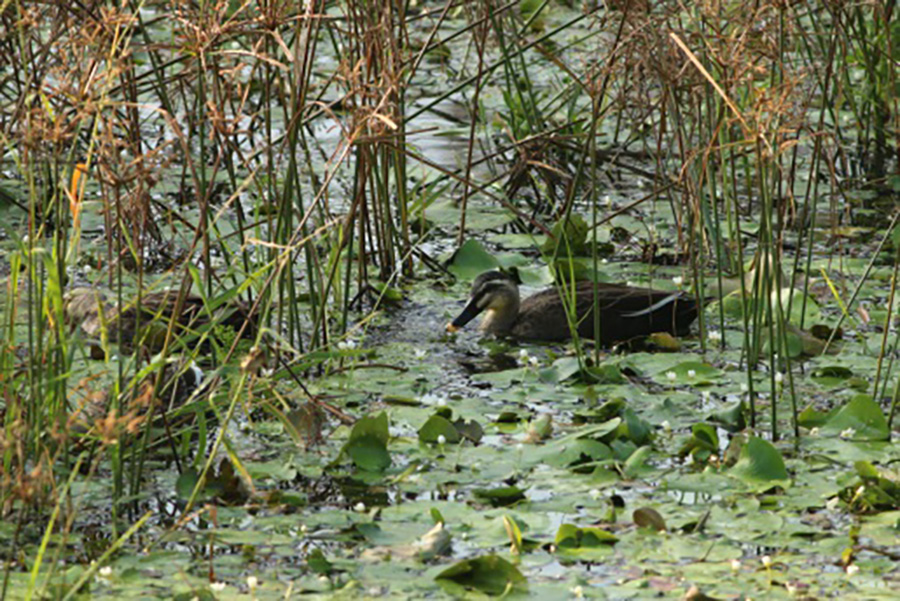
At Moon Pond, visitors can closely observe bird behavior.
Promotion of Environmental Education
Together, we implement SDG Goal 4: "Ensure inclusive and equitable quality education and promote lifelong learning opportunities for all." We offer quality environmental education programs that continuously support students and teachers from rural and underserved schools, as well as children with special needs, by providing resources and opportunities for engaging with nature.
In 2023, we held 13 sessions for 505 teachers and students from rural and underserved areas, along with 8 sessions for 318 students with special needs. Participants observed the beauty of wetland ponds, learned about bird behavior, and explored the relationship between Moon Pond’s ecosystem and birdlife, as well as the importance of environmental sustainability. Lunch was served in metal lunchboxes, promoting practical green living values for both teachers and students.
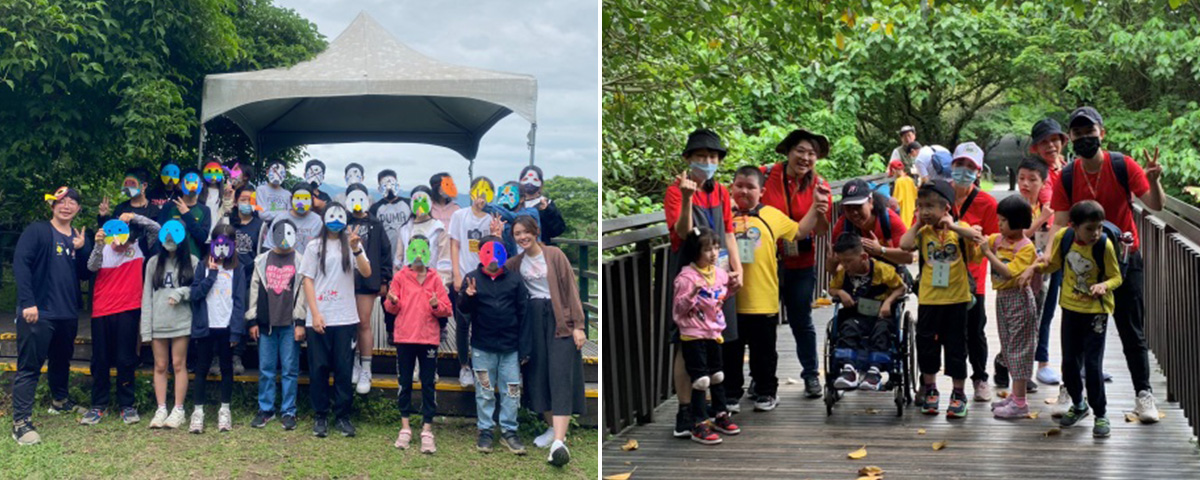
Left: Students from Rural and Underserved Areas Craft Bird Masks; Right: Outdoor Education for Students with Special Needs
Conservation of Waterbird Breeding Habitats
After Guandu Nature Park was established in 2001, it took just two years for the black-winged stilt (Himantopus himantopus), originally a winter visitor, to remain after winter and breed at the park for the first time in May 2003. This marked the first recorded breeding of the species in northern Taiwan, inspiring the team and underscoring the importance of habitat protection.
Since then, every April and May, black-winged stilts can be seen nurturing their young in the core conservation area of Guandu Nature Park. The stable presence of this stilt population not only provides a subject for guided interpretation and enhances observation opportunities, but also highlights the crucial importance of habitat protection and the preservation of life.
With the support of the Wistorn Foundation, the following conservation efforts were carried out.
Floating Platform Updates: The four old floating platforms in the core conservation area have been replaced, and an additional platform has been installed at Pool No. 10, bringing the total to five platforms. During the winter of 2023, we observed Eastern spot-billed ducks (Anas zonorhyncha) searching for nesting sites, along with visits from snipe. By early 2024, many black-winged stilts were also seen scouting for nesting areas to start their families. We invite everyone to visit the second floor of the Nature Center to use our high-powered telescopes and observe these new residents.
Island and Nesting Habitat Construction: Before March, we rebuilt the small island, which was prone to flooding due to high water levels, by raising its elevation and expanding the area suitable for black-winged stilt nesting. This helps reduce the risk of nests being flooded during the heavy rains of April and May. In March, we also cut back the tall grasses on the island to create a bare-ground environment more suitable for nesting. Additionally, we cleared sections of the surrounding earthen embankments to attract black-winged stilts for resting and other activities.
Spring crop management keeps the water levels in the rice fields shallow, creating an ideal foraging environment for small shorebirds, including young black-winged stilt chicks. During the period when black-winged stilts are pairing, nesting, and caring for their chicks (April and May), mowing the pathways reduces the chicks' energy expenditure, minimizes the risk of them getting lost or encountering predators, and ultimately improves their survival rate.
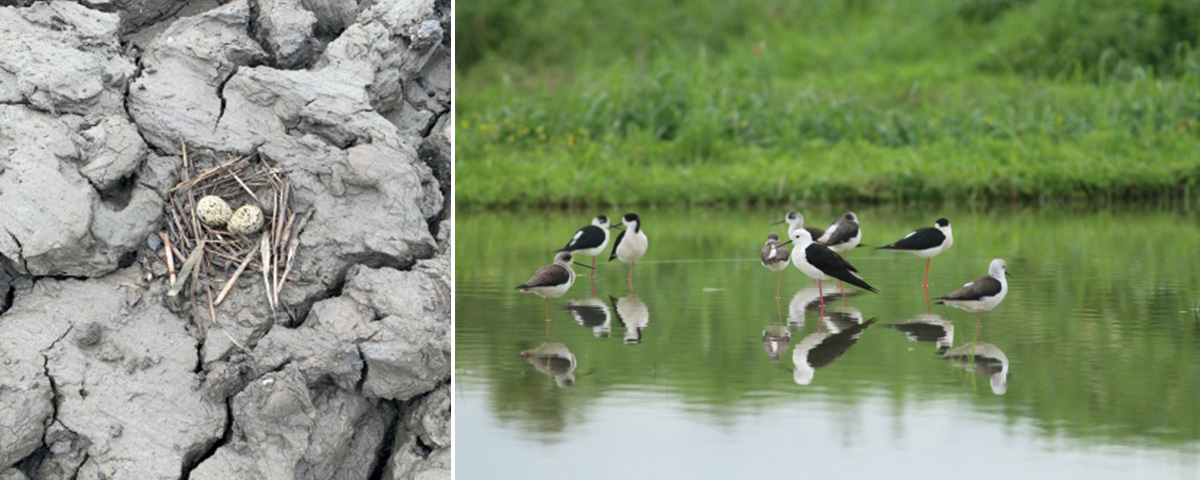
Left: The island offers an ideal bare-ground environment for nesting. Right: The rice field environment beautifully exemplifies sustainable living for both humans and wildlife.
Enhance Wistorn colleagues' understanding of the park
Throughout the year, we organized five work holidays, with 90 participants contributing to the park’s maintenance in alignment with seasonal changes, even during the scorching summer. Their dedication during these full-day events not only provided physical support for Guandu Nature Park but also nourished the body, mind, and spirit through environmental education programs.
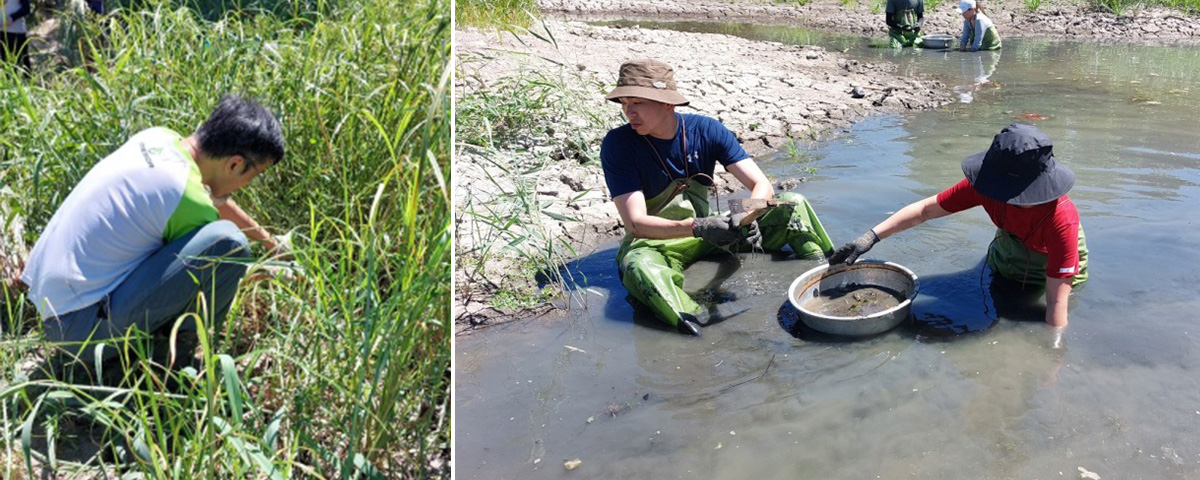
Undeterred by the blazing sun, we engage in environmental maintenance.
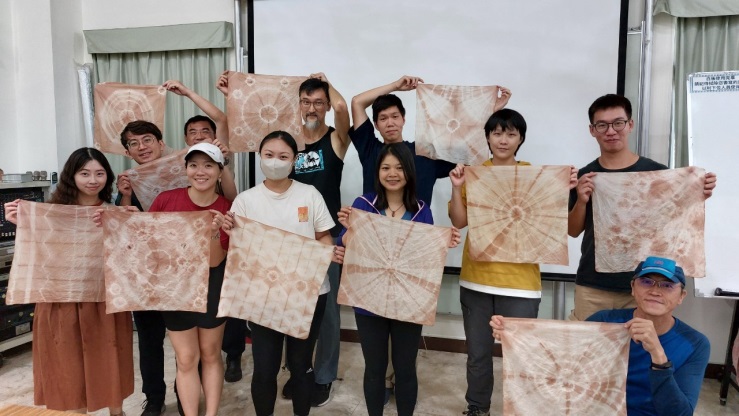
Environmental Education Program: Plant Dyeing—A Gratitude to Nature's Gifts!
In addition to supporting the 2023 Guandu International Nature Art Festival, we encourage Wistron employees to use their off-hours for activities ranging from bird identification to driftwood crafts, incorporating their creations into the adopted second observation hut. The ' Ascending Blessings' project symbolizes the thriving ecosystem of the Guandu Wetland. At the end of the year, we hosted the 'Art Rendezvous at Guandu' event, celebrating the park’s anniversary with art displays, a small farmers' market, musical performances, interactive games, and guided tours. This event gave colleagues the chance to celebrate the park’s anniversary with family and friends while exploring artistic concepts and enjoying the holiday moments nature provides.
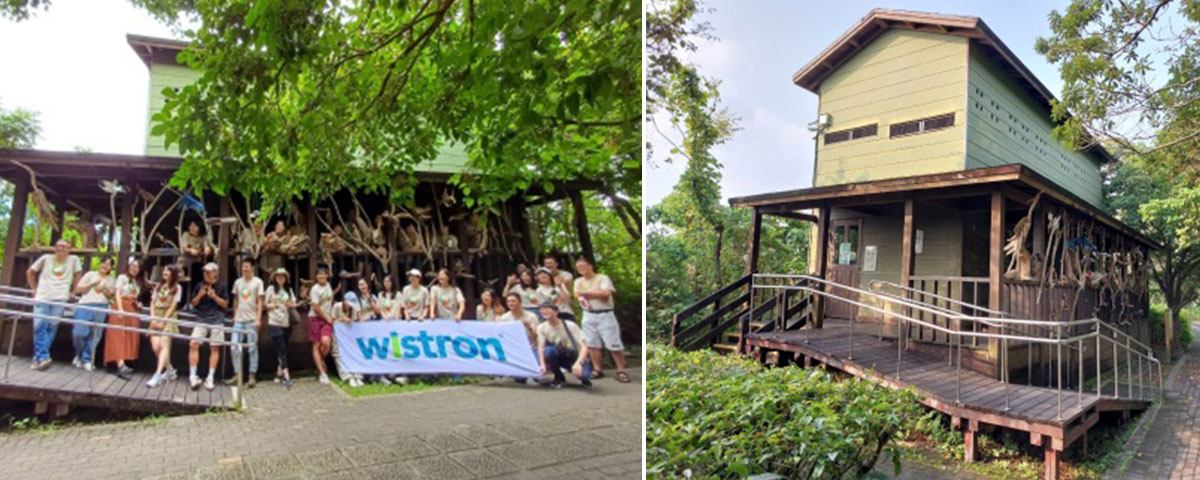
Through their creations, Wistron employees bring abundant blessings to the park.
Video Links: Wistron ' Ascending Blessings' Full Version (11 minutes) / Short Version (5 minutes) Video Link: Official Film of the Guandu International Nature Art Festival
Cross-Disciplinary Collaboration to Celebrate the Beauty of Guandu Nature Park
Through cross-disciplinary collaboration with the 2023 National Geographic Taiwan Photo Contest’s publication, Ecological Sustainability Photography Special Edition, we advocate for ethical bird photography practices. Additionally, Guandu Nature Park was designated as a key shooting location for the Ecological Sustainability Report event. Under the guidance of ecological photography mentor Ke Chin-Yuan, Kuo Ting-Chung, an award winner in the contest’s ecological sustainability category, honed his photography skills and captured the natural beauty of Guandu Wetlands from dawn to dusk, helping to raise awareness of the park to a broader audience.
Online Edition of the 'Ecological Sustainability Photography Special Edition' Video of 'Ecological Sustainability Report'
We would like to extend our heartfelt thanks to the Wistron Foundation and the Wild Bird Society of Taipei for their collaboration throughout 2023, which has supported and affirmed the efforts of the Wild Bird Society of Taipei in the Guandu Plain. Together, we are committed to safeguarding Guandu Nature Park, the green gem of Taipei City, by prioritizing habitat conservation, promoting environmental education, and upholding sustainable management principles. Our shared goal is to restore a beautiful environment that embodies the concept of harmonious coexistence with nature.




 中
中